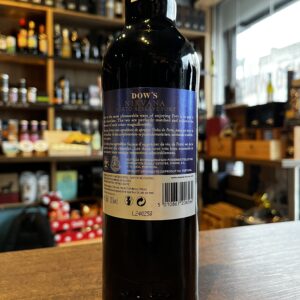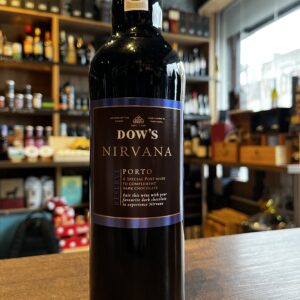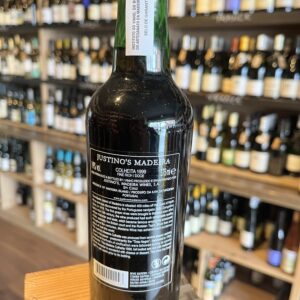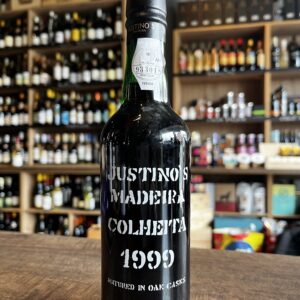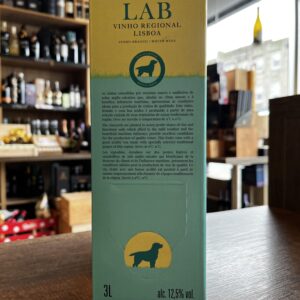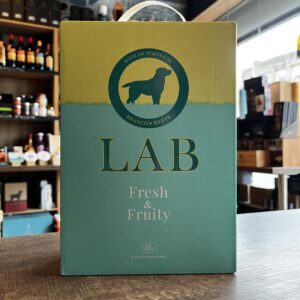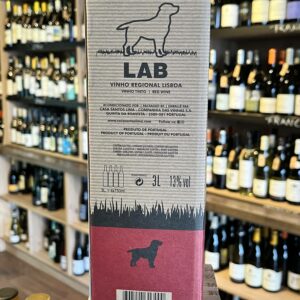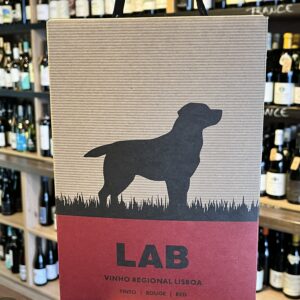-
Out of stock
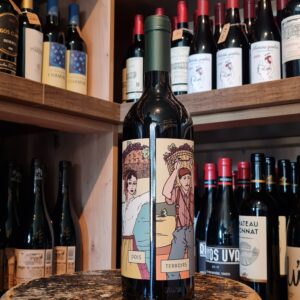 This blend of Aragonez, Syrah and Pinot Noir results from the fusion of two distinct terroirs, where the Mediterrean climate of the Alentejan interior meets the cool maritime climate of the Alentejan Atlantic coast. Pinot Noir, grown in sandy soils in our cool, Alentejan Atlantic coastal vineyards, provides freshness and elegance to balance the fruit generosity of the Aragonez and Syrah grown further inland, on the ancient clay over limestone soils surrounding the Estate. Viticulture here is certified sustainable. Attractive lifted red berry fruit aromas, with a touch of vanilla. Vibrant fruit on the palate, juicy and intense, finishing with a nice acidity.
This blend of Aragonez, Syrah and Pinot Noir results from the fusion of two distinct terroirs, where the Mediterrean climate of the Alentejan interior meets the cool maritime climate of the Alentejan Atlantic coast. Pinot Noir, grown in sandy soils in our cool, Alentejan Atlantic coastal vineyards, provides freshness and elegance to balance the fruit generosity of the Aragonez and Syrah grown further inland, on the ancient clay over limestone soils surrounding the Estate. Viticulture here is certified sustainable. Attractive lifted red berry fruit aromas, with a touch of vanilla. Vibrant fruit on the palate, juicy and intense, finishing with a nice acidity. -
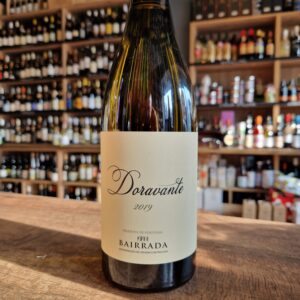
Excellent alternative for Burgundy 1er cru's or Villages.
This wine was born from Arinto vines around 30 years old and very old vines from Bical and Cercial. It is a different approach to these grapes and to the expression of the clay-limestone soils and the Atlantic climate of the region. The 2018 harvest turns the page to a more complex and creamy profile but with the lightness and freshness of always.
The producer Nuno Mira do Ó is passionate about authentic wines that are able to translate the “terroir” where they come from, made with indigenous grape varieties, with minimal intervention and respect for nature, with the potential to age and especially that provide pleasure to those who drink them
Excellent to accompany soft cheeses, cod, octopus and white meats.
-
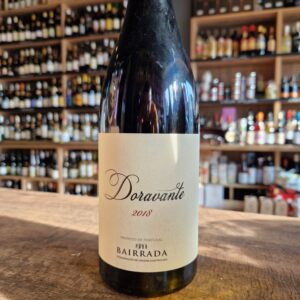
Nuno's philosophy is in keeping with this. In his own words, his wines are "a pursuit for balance with the utmost respect for nature".
Think of Doravante as an old-school claret, with lighter red fruit flavour and fresh pencil shaving mineral character. The blend is Baga and the better-known Touriga Nacional, fresh and elegant and long. So delicious and such an exciting region of Portugal.
Excellent served with strong dark meat and game dishes
-
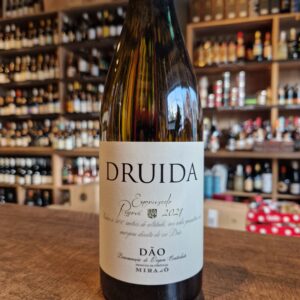 Mira do O produces expressive, concentrated wines. Despite the concentration, all the wines are fresh, elegant, well-balanced and shows great maturation potential. Dao region is valued by wine lovers for its expressiveness, freshness, concentration of taste and longevity of the wine. The region is a little further away from the Atlantic Ocean, but its cold winds still cool Dao vineyards. For this reason, the wine is high levels of acidity and great balance. The poor granite soil prevalent in the region gives the wines more texture, depth and spice. It is worth mentioning that here is a register and a large part of the old, local Portuguese grapes. Mira do O Druida Encruzado Reserva is made from a small vineyard located on a 500-meter plateau. This plateau provides protection from excess Atlantic moisture. At the same time, the temperature fluctuations caused by this altitude allow the grapes to ripen perfectly during the day, but they are more refreshing due to the cooling vineyards. The winemaker follows the principle of minimalist intervention: to change the wine as little as possible during its production. For this reason, the very characteristics of the grape stand out. Pair it with aperitif, roast white meats, sautee greens
Mira do O produces expressive, concentrated wines. Despite the concentration, all the wines are fresh, elegant, well-balanced and shows great maturation potential. Dao region is valued by wine lovers for its expressiveness, freshness, concentration of taste and longevity of the wine. The region is a little further away from the Atlantic Ocean, but its cold winds still cool Dao vineyards. For this reason, the wine is high levels of acidity and great balance. The poor granite soil prevalent in the region gives the wines more texture, depth and spice. It is worth mentioning that here is a register and a large part of the old, local Portuguese grapes. Mira do O Druida Encruzado Reserva is made from a small vineyard located on a 500-meter plateau. This plateau provides protection from excess Atlantic moisture. At the same time, the temperature fluctuations caused by this altitude allow the grapes to ripen perfectly during the day, but they are more refreshing due to the cooling vineyards. The winemaker follows the principle of minimalist intervention: to change the wine as little as possible during its production. For this reason, the very characteristics of the grape stand out. Pair it with aperitif, roast white meats, sautee greens -
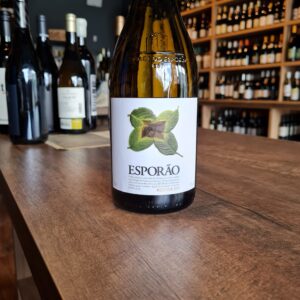 A classic wine(Organic) obtained from grapes grown at Herdade do Esporão, which showcases the consistency and rich character typical of the best Alentejo wines. It Is from vineyards that on average are about 18 years old, the soils are a mixture of granite and schist with clay and loam, and an integrated pest control and a sustainable viticultural approach is employed. Hand-harvested grapes are de-stemmed, then left with skin contact for six hours before chilling and fermentation, 50% in tank with fine lees ageing and 50% in barriques where it is aged for six months. French and American oak is used, a third new, and the wine does not undergo a malolactic fermentation. Aromas of ripe tangerine, honey and apricot with subtle notes of toast and smoke from the barrel fermentation. The palate is complex, creamy, showing ripe fruit flavours and mineral notes with a long, fresh finish.
A classic wine(Organic) obtained from grapes grown at Herdade do Esporão, which showcases the consistency and rich character typical of the best Alentejo wines. It Is from vineyards that on average are about 18 years old, the soils are a mixture of granite and schist with clay and loam, and an integrated pest control and a sustainable viticultural approach is employed. Hand-harvested grapes are de-stemmed, then left with skin contact for six hours before chilling and fermentation, 50% in tank with fine lees ageing and 50% in barriques where it is aged for six months. French and American oak is used, a third new, and the wine does not undergo a malolactic fermentation. Aromas of ripe tangerine, honey and apricot with subtle notes of toast and smoke from the barrel fermentation. The palate is complex, creamy, showing ripe fruit flavours and mineral notes with a long, fresh finish. -
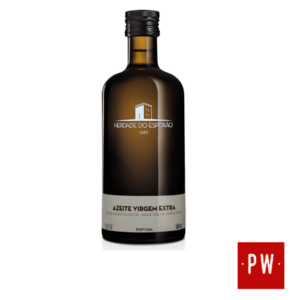 A smooth, harmonious olive oil with a good balance of those fruity aromas typical of the Alentejo. Excellent for cooking and frying in a wide variety of recipes including soups, baking and roasting.
A smooth, harmonious olive oil with a good balance of those fruity aromas typical of the Alentejo. Excellent for cooking and frying in a wide variety of recipes including soups, baking and roasting.Technical sheet
-
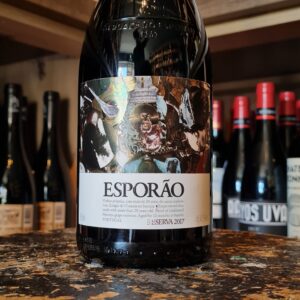 This is the first wine made by Esporão back in 1985. Label illustrated by António Poppe that changes with every organic vintage. Classic wine style made from estate grown grapes that shows the consistency and the rich, ripe fruit characters which are typical of the best Alentejo red wines. Deep dark red colour with intense spicy aroma of mature red berry fruits with discrete oak complexity. On the palate it is elegant, dense and creamy.
This is the first wine made by Esporão back in 1985. Label illustrated by António Poppe that changes with every organic vintage. Classic wine style made from estate grown grapes that shows the consistency and the rich, ripe fruit characters which are typical of the best Alentejo red wines. Deep dark red colour with intense spicy aroma of mature red berry fruits with discrete oak complexity. On the palate it is elegant, dense and creamy. -
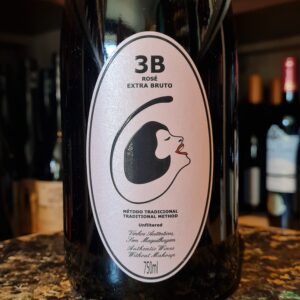 The Filipa Pato 3B Sparkling Rosé is a delicious treat of a wine from one of my favorite winemakers in Portugal. Filipa Pato is the daughter of arguably one of Portugal's most famous winemakers, Luis Pato. Passion for the traditional indigenous grape varietals of Bairrada led Filipa Pato to start her own project in 2001. She works a total of 12 hectares of vineyards scattered in various plots throughout the Bairrada appellation of Portugal. Utilizing biodynamic farming practices and minimal-intervention winemaking. The 3B is a homage to the traditional sparkling wines of Bairrada, with this being a blend of the indigenous Baga and Bical grapes. The Bical adds mineral and citrus notes to the berry red fruit notes of the Baga. This is a great little sparkler with a dry finish. Filipa and her husband, Belgian sommelier and restaurateur William Wouters, produce vinhos autênticos sem maquilagem – 'Authentic Wines Without Makeup.' 3B's-Bairrada, Baga & Bical
The Filipa Pato 3B Sparkling Rosé is a delicious treat of a wine from one of my favorite winemakers in Portugal. Filipa Pato is the daughter of arguably one of Portugal's most famous winemakers, Luis Pato. Passion for the traditional indigenous grape varietals of Bairrada led Filipa Pato to start her own project in 2001. She works a total of 12 hectares of vineyards scattered in various plots throughout the Bairrada appellation of Portugal. Utilizing biodynamic farming practices and minimal-intervention winemaking. The 3B is a homage to the traditional sparkling wines of Bairrada, with this being a blend of the indigenous Baga and Bical grapes. The Bical adds mineral and citrus notes to the berry red fruit notes of the Baga. This is a great little sparkler with a dry finish. Filipa and her husband, Belgian sommelier and restaurateur William Wouters, produce vinhos autênticos sem maquilagem – 'Authentic Wines Without Makeup.' 3B's-Bairrada, Baga & Bical -
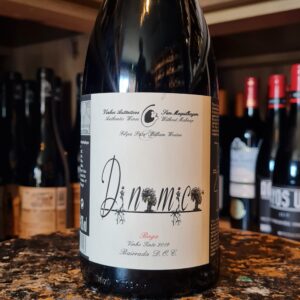 Filipa Pato is the confirmation of the old saying "son of fish knows how to swim". Although she followed the footsteps of her father Luís Pato, even in her academic training, Filipa always wanted to have her own world, her own project, where she would show her ideas, and go up with her own pulse. It was the 2001 harvest, a great year in Bairrada, which would provide all of this. That year, she decided to walk on her own feet, creating her dream. The success was immediate, and soon she rose to the status of one of the most brilliant winemakers in Portugal. The wines are the result of Filipa's innovative and brilliant spirit. They were quickly at the forefront of national and international criticism. In 2011, with her husband William Wouters, a prestigious Belgian Sommelier and owner of the Pazzo restaurant in Antwerp, Filipa receives the title "Newcomer of the year".
Filipa Pato is the confirmation of the old saying "son of fish knows how to swim". Although she followed the footsteps of her father Luís Pato, even in her academic training, Filipa always wanted to have her own world, her own project, where she would show her ideas, and go up with her own pulse. It was the 2001 harvest, a great year in Bairrada, which would provide all of this. That year, she decided to walk on her own feet, creating her dream. The success was immediate, and soon she rose to the status of one of the most brilliant winemakers in Portugal. The wines are the result of Filipa's innovative and brilliant spirit. They were quickly at the forefront of national and international criticism. In 2011, with her husband William Wouters, a prestigious Belgian Sommelier and owner of the Pazzo restaurant in Antwerp, Filipa receives the title "Newcomer of the year". -
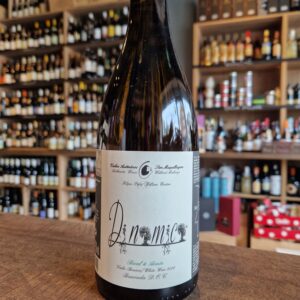 Filipa Pato and husband, William Wouters have created an expressive range of wines representing the native grape varietals of the Barriada region. Their philosophy is simple: "create authentic wines without make-up to express the true nature of the vineyards they come from". Bairrada is a coastal DOC which borders Vinho Verde, Dão and Lisboa. It has mild and wet winters and hot windy summers. The climatic thermal range, brought about by the Atlantic influence, brings high acidity and freshness to the grapes here. Filipa and William practice biodynamic viticulture and are undergoing conversion to organic certification. The wine is unfined. Drink with sheep and goats cheese, dressed salads, and delicate poultry dishes.
Filipa Pato and husband, William Wouters have created an expressive range of wines representing the native grape varietals of the Barriada region. Their philosophy is simple: "create authentic wines without make-up to express the true nature of the vineyards they come from". Bairrada is a coastal DOC which borders Vinho Verde, Dão and Lisboa. It has mild and wet winters and hot windy summers. The climatic thermal range, brought about by the Atlantic influence, brings high acidity and freshness to the grapes here. Filipa and William practice biodynamic viticulture and are undergoing conversion to organic certification. The wine is unfined. Drink with sheep and goats cheese, dressed salads, and delicate poultry dishes. -
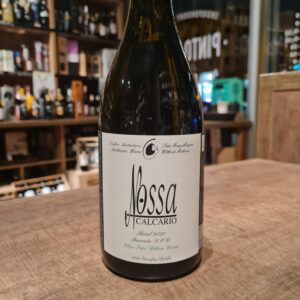 This mineral-driven white wine from Filipa Pato is akin to top quality white Burgundy. Using the Bical grape, the wine is aged in old French oak barrels and displays a great balance between creamy richness and lean minerality. Following in the footsteps in the winemaking traditions of her well-known father, Luis, Filipa Pato has now, in her own right, garnered a reputation for producing a superb range of wines in the heart of Bairrada, in Ois do Bairro. Focussing on Bairrada’s local native grape varieties, Filipa’s top-level white. It should be served not too cold, decanted into elegant glasses. It goes well with cheeses, fish dishes and salads.
This mineral-driven white wine from Filipa Pato is akin to top quality white Burgundy. Using the Bical grape, the wine is aged in old French oak barrels and displays a great balance between creamy richness and lean minerality. Following in the footsteps in the winemaking traditions of her well-known father, Luis, Filipa Pato has now, in her own right, garnered a reputation for producing a superb range of wines in the heart of Bairrada, in Ois do Bairro. Focussing on Bairrada’s local native grape varieties, Filipa’s top-level white. It should be served not too cold, decanted into elegant glasses. It goes well with cheeses, fish dishes and salads. -
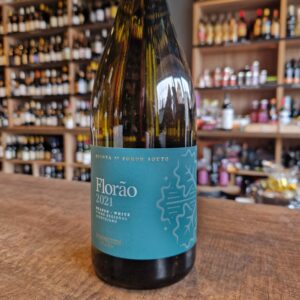 Quinta da Fonte Souto is in the Portalegre subregion of the Alto Alentejo in southern Portugal. Close to the São Mamede range (1,025 metres), the property benefits from the area’s altitude with its cooler microclimate in sharp contrast to the Alentejo region’s typically hot and dry conditions. Yields are low due to the schist and granite soils, which are less fertile than those found in the flat and rolling terrain which characterizes the majority of the Alentejo.
Quinta da Fonte Souto is in the Portalegre subregion of the Alto Alentejo in southern Portugal. Close to the São Mamede range (1,025 metres), the property benefits from the area’s altitude with its cooler microclimate in sharp contrast to the Alentejo region’s typically hot and dry conditions. Yields are low due to the schist and granite soils, which are less fertile than those found in the flat and rolling terrain which characterizes the majority of the Alentejo. -
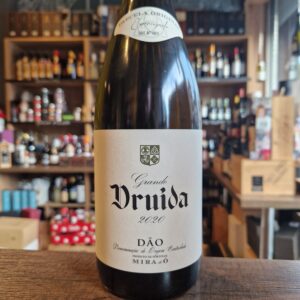 Nuno Mira do Ó is a one-man viticulture and enology powerhouse. A deep-thinking, well-traveled, generous person totally focused on expressing the great terroir of his native country. His peers look his way for guidance because his experience bringing forth wines of place covers almost every major wine region in Portugal. He launched his eponymous brand in the Dão wine region with Druida Encruzado. The wine is named for the ancient Celtic druids whose connection to the earth and plants drove their quest to achieve spiritual equilibrium through the balance of nature. As an enologist and viticulturist, Nuno is in constant search for balance between the soil, the climate, and the vines. Mira do Ó wines seek to attain perfect sensory balance with the utmost respect for nature. This is a pursuit driven by passion and a desire to share wines filled with freshness, elegance, and aging potential. These wines are handcrafted in the Dão from indigenous varietals with vineyards in granite soil sitting above 500 meters of elevation to capture the region’s cool climate. Store the bottles lying down in a cool place (15-17ºC). Drink at 11-12º C and pair with fine food.
Nuno Mira do Ó is a one-man viticulture and enology powerhouse. A deep-thinking, well-traveled, generous person totally focused on expressing the great terroir of his native country. His peers look his way for guidance because his experience bringing forth wines of place covers almost every major wine region in Portugal. He launched his eponymous brand in the Dão wine region with Druida Encruzado. The wine is named for the ancient Celtic druids whose connection to the earth and plants drove their quest to achieve spiritual equilibrium through the balance of nature. As an enologist and viticulturist, Nuno is in constant search for balance between the soil, the climate, and the vines. Mira do Ó wines seek to attain perfect sensory balance with the utmost respect for nature. This is a pursuit driven by passion and a desire to share wines filled with freshness, elegance, and aging potential. These wines are handcrafted in the Dão from indigenous varietals with vineyards in granite soil sitting above 500 meters of elevation to capture the region’s cool climate. Store the bottles lying down in a cool place (15-17ºC). Drink at 11-12º C and pair with fine food. -
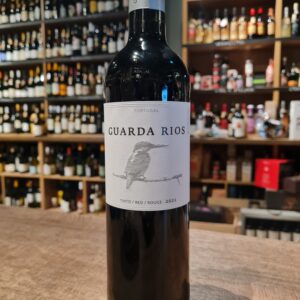 The first Guarda Rios harvest was done in 2006 and, curiously, not in the Alentejo. This wine is associated to the Winemaker and Director of Monte da Ravasqueira, who, in 2012, brought the Guarda Rios with him. Like the birds, this wine migrated and settled next to the dams on a property in Arraiolois, where it found the ideal terroir in which to express all its exuberance and vivacity. The family currently owns 45 hectares under vine in the Alentejo Plains. The highlight of this vineyard is that there are close to 8 diverse soil types and 29 carefully selected plots here. Therefore, it is great for growing quite a few full-bodied grape varietals. The vines are grown at an average height of about 270m above sea level. The Alentejo Plains cover almost one-third of Portugal, and are home to various soil types such as clay, sandy, marble, granite, limestone, shale and more. Thanks to the hot & dry Mediterranean climate in this area, it is ideal for growing some of the rare & indigenous varietals. The native reds grown here are Aragonez, Trincadeira and Alicante Bouschet. Roupeiro, Arinto and Antao Vaz are the native whites grown here. All of these are grown in organized regions along Alentejo. The main regions of the plains where the vines are grown with utmost care & dedication are Borba, Redondo, Reguengos and Evora. These regions are divided based on their climate, soil quality and their ability to create full-bodied & aromatic grapes.
The first Guarda Rios harvest was done in 2006 and, curiously, not in the Alentejo. This wine is associated to the Winemaker and Director of Monte da Ravasqueira, who, in 2012, brought the Guarda Rios with him. Like the birds, this wine migrated and settled next to the dams on a property in Arraiolois, where it found the ideal terroir in which to express all its exuberance and vivacity. The family currently owns 45 hectares under vine in the Alentejo Plains. The highlight of this vineyard is that there are close to 8 diverse soil types and 29 carefully selected plots here. Therefore, it is great for growing quite a few full-bodied grape varietals. The vines are grown at an average height of about 270m above sea level. The Alentejo Plains cover almost one-third of Portugal, and are home to various soil types such as clay, sandy, marble, granite, limestone, shale and more. Thanks to the hot & dry Mediterranean climate in this area, it is ideal for growing some of the rare & indigenous varietals. The native reds grown here are Aragonez, Trincadeira and Alicante Bouschet. Roupeiro, Arinto and Antao Vaz are the native whites grown here. All of these are grown in organized regions along Alentejo. The main regions of the plains where the vines are grown with utmost care & dedication are Borba, Redondo, Reguengos and Evora. These regions are divided based on their climate, soil quality and their ability to create full-bodied & aromatic grapes. -
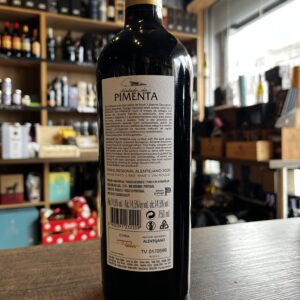
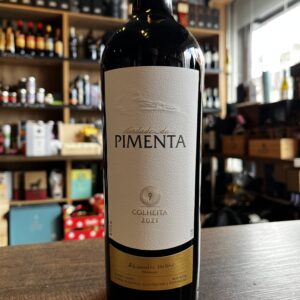 Casa Relvas is a family-owned winery that was born out of a desire to give continuity to the family history associated with the land for five generations. The project began in 1997, Alexandre Relvas, who learned about his extensive family roots in the estate "Herdade De Sao Miguel" in Alentejo. In 2001, the first 10 hectares of vineyards were planted. Next year, Nuno Franco, a consultant in viticulture and enology, joins the project, he continues to plant another 25 hectares of vineyards. In 2003, a new winery was built on the estate with the possibility of vinification of 500 tons of grapes. It was headed by winemaker Fernanda Gomes. The following year, the first wine of the farm was launched on the market. By 2010, wine sales doubled to 1 million bottles. The following year, the company acquired the estate "Herdade da Pimenta" with 65 hectares of vineyards and a winery that can process 2.5 tons of grapes. Since 2016, the company also began to grow olive trees. The mission of Casa Relvas is to produce quality wines that accompany every moment of life, wines that can bring special pleasure from food, celebration, meeting with friends and beautify the memories of bright moments of life. This wine accompanies red meats, roast beef and grilled meats.
Casa Relvas is a family-owned winery that was born out of a desire to give continuity to the family history associated with the land for five generations. The project began in 1997, Alexandre Relvas, who learned about his extensive family roots in the estate "Herdade De Sao Miguel" in Alentejo. In 2001, the first 10 hectares of vineyards were planted. Next year, Nuno Franco, a consultant in viticulture and enology, joins the project, he continues to plant another 25 hectares of vineyards. In 2003, a new winery was built on the estate with the possibility of vinification of 500 tons of grapes. It was headed by winemaker Fernanda Gomes. The following year, the first wine of the farm was launched on the market. By 2010, wine sales doubled to 1 million bottles. The following year, the company acquired the estate "Herdade da Pimenta" with 65 hectares of vineyards and a winery that can process 2.5 tons of grapes. Since 2016, the company also began to grow olive trees. The mission of Casa Relvas is to produce quality wines that accompany every moment of life, wines that can bring special pleasure from food, celebration, meeting with friends and beautify the memories of bright moments of life. This wine accompanies red meats, roast beef and grilled meats. -
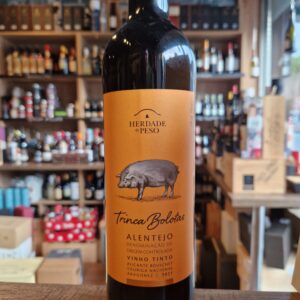 Moving freely through the cork oak forests of the Alentejo, where it feeds on acorns among other things, the Alentejo pig, a species indigenous to Portugal, is Europe's only surviving pastoral pig. Due to the way in which it forms part of the landscape and preserves the region's Mediterranean forest, it is part of Alentejo's heritage. Named after this reputable pig, this wine combines two of Alentejo's biggest symbols. All the grapes used in this wine were produced in accordance with the Sustainable Agriculture Integrated Production guidelines as defined by the International Organisation for Biological and Integrated Control (OILB/IOBC): www.iobc-wprs.org. The rigorous compliance with these practices is certified by an independent organisation, recognized by the Portuguese State. With its smooth tannins and enormous balance, this wine pairs wonderfully with light dishes, such as poultry and pasta, as well as with sausages, ham and more sophisticated meat dishes.
Moving freely through the cork oak forests of the Alentejo, where it feeds on acorns among other things, the Alentejo pig, a species indigenous to Portugal, is Europe's only surviving pastoral pig. Due to the way in which it forms part of the landscape and preserves the region's Mediterranean forest, it is part of Alentejo's heritage. Named after this reputable pig, this wine combines two of Alentejo's biggest symbols. All the grapes used in this wine were produced in accordance with the Sustainable Agriculture Integrated Production guidelines as defined by the International Organisation for Biological and Integrated Control (OILB/IOBC): www.iobc-wprs.org. The rigorous compliance with these practices is certified by an independent organisation, recognized by the Portuguese State. With its smooth tannins and enormous balance, this wine pairs wonderfully with light dishes, such as poultry and pasta, as well as with sausages, ham and more sophisticated meat dishes. -
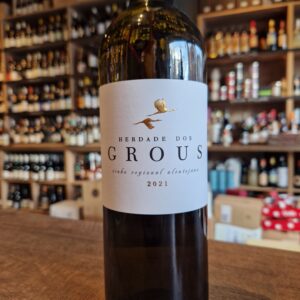 Created from scratch in the Alentejo landscape, you will find Herdade dos Grous. In Albernoa, 17 km from Beja, Herdade dos Grous brings together the production of wine, livestock, rural tourism and wine tourism. Alentejo, Portugal’s largest province holds the traditional Portuguese charm and a Moorish heritage, which can be seen in all its architecture. Its Continental climate with Mediterranean influences, offers ideal conditions for the production of fantastic wines and extremely high quality regional products. The establishment of the estate and the cultivation of the vines (1987), as well as the design of a state-of-the-art wine cellar (built in 2005) are all based on the latest findings in high-end viticulture. ’Herdade dos Grous’ represents the current pioneering spirit of Portugal’s wine-growing business like no other estate. We recommend serving this wine with seafood, poultry or pasta carbonara. Ideal serving temperature is 10 to 12°C
Created from scratch in the Alentejo landscape, you will find Herdade dos Grous. In Albernoa, 17 km from Beja, Herdade dos Grous brings together the production of wine, livestock, rural tourism and wine tourism. Alentejo, Portugal’s largest province holds the traditional Portuguese charm and a Moorish heritage, which can be seen in all its architecture. Its Continental climate with Mediterranean influences, offers ideal conditions for the production of fantastic wines and extremely high quality regional products. The establishment of the estate and the cultivation of the vines (1987), as well as the design of a state-of-the-art wine cellar (built in 2005) are all based on the latest findings in high-end viticulture. ’Herdade dos Grous’ represents the current pioneering spirit of Portugal’s wine-growing business like no other estate. We recommend serving this wine with seafood, poultry or pasta carbonara. Ideal serving temperature is 10 to 12°C -
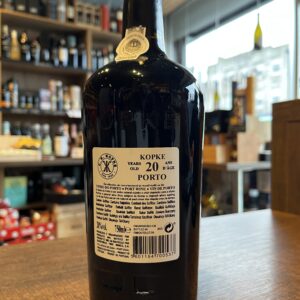
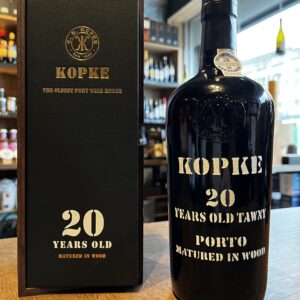 Kopke, a house specialising in aged tawny and aged white ports, is the oldest established port producer, in existence since 1638. There are special places in the world. Kopke found one of them. Quinta de São Luiz is located on the left bank of the river Douro, near Pinhão, in the parish of Tabuaço. It is an imposing estate, considered one of the most emblematic of the Douro region. The Quinta has gone through two major changes: on the one hand, the construction of the Bagaúste dam, with the consequent rise of the water level and the loss of vineyard land; on the other, the enlargement of the total area with the acquisition of several other properties in the area. The estate is made up of 125 hectares, 90 of which are planted with vines. The main grape varieties grown here are Touriga Nacional, Touriga Franca, Tinta Roriz, Tinta Cão. There are also small plots of Tinta Barroca and Souzão. The vines are classified as A, the highest grade in the Demarcated Region of the Douro. Irresistible with a starter of foie gras with aubergine and walnuts. A great choice for an endless array of desserts, such as toffee brownies, chocolate and pistachio pavé, or crostini of walnuts with chèvre. When teh weather picks up or the height of the Summer, serving this Port slightly chilly is a must.
Kopke, a house specialising in aged tawny and aged white ports, is the oldest established port producer, in existence since 1638. There are special places in the world. Kopke found one of them. Quinta de São Luiz is located on the left bank of the river Douro, near Pinhão, in the parish of Tabuaço. It is an imposing estate, considered one of the most emblematic of the Douro region. The Quinta has gone through two major changes: on the one hand, the construction of the Bagaúste dam, with the consequent rise of the water level and the loss of vineyard land; on the other, the enlargement of the total area with the acquisition of several other properties in the area. The estate is made up of 125 hectares, 90 of which are planted with vines. The main grape varieties grown here are Touriga Nacional, Touriga Franca, Tinta Roriz, Tinta Cão. There are also small plots of Tinta Barroca and Souzão. The vines are classified as A, the highest grade in the Demarcated Region of the Douro. Irresistible with a starter of foie gras with aubergine and walnuts. A great choice for an endless array of desserts, such as toffee brownies, chocolate and pistachio pavé, or crostini of walnuts with chèvre. When teh weather picks up or the height of the Summer, serving this Port slightly chilly is a must. -
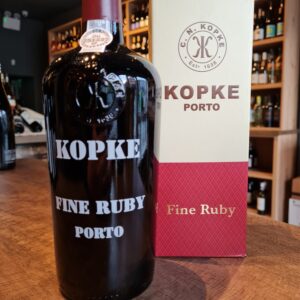 There are special places in the world. Kopke found one of them. Quinta de São Luiz is located on the left bank of the river Douro, near Pinhão, in the parish of Tabuaço. It is an imposing estate, considered one of the most emblematic of the Douro region. The Quinta has gone through two major changes: on the one hand, the construction of the Bagaúste dam, with the consequent rise of the water level and the loss of vineyard land; on the other, the enlargement of the total area with the acquisition of several other properties in the area. The estate is made up of 125 hectares, 90 of which are planted with vines. The main grape varieties grown here are Touriga Nacional, Touriga Franca, Tinta Roriz, Tinta Cão. There are also small plots of Tinta Barroca and Souzão. The vines are classified as A, the highest grade in the Demarcated Region of the Douro.
There are special places in the world. Kopke found one of them. Quinta de São Luiz is located on the left bank of the river Douro, near Pinhão, in the parish of Tabuaço. It is an imposing estate, considered one of the most emblematic of the Douro region. The Quinta has gone through two major changes: on the one hand, the construction of the Bagaúste dam, with the consequent rise of the water level and the loss of vineyard land; on the other, the enlargement of the total area with the acquisition of several other properties in the area. The estate is made up of 125 hectares, 90 of which are planted with vines. The main grape varieties grown here are Touriga Nacional, Touriga Franca, Tinta Roriz, Tinta Cão. There are also small plots of Tinta Barroca and Souzão. The vines are classified as A, the highest grade in the Demarcated Region of the Douro. -
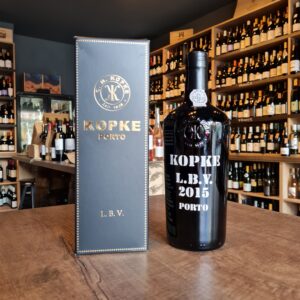 The wine owes its name to the port city of Porto, but comes from the Douro Valley. Here you will find one of the most spectacular wine landscapes in the world with terraced vineyards on steep slopes. It is scorching hot in summer, freezing cold in winter. The Douro Valley was already demarcated in 1756, making it the oldest regulated area of origin in the world. Port itself is a fortified wine. By interrupting the fermentation by adding wine alcohol, the wine retains its residual sugars and also gets its relatively high alcohol percentage. Port does not stand for a single wine, but for a whole series of wines. Wines with very different styles and tastes due to differences in the blending and aging of the base wines. In 1636 Nicolau Kopkë settled in Portugal as 'consul general' (a kind of representative) of the Hanseatic League, a partnership between merchants and cities, during the Middle Ages. Two years later, the first bottles of wine were shipped to Northern Europe. And when Nicolau bought a farm in the Douro in 1781, he changed from buyer to producer. Port wine soon became the focus of the company. Kpke now is one of the oldest Port Wine House. Recognized by the variety and distinction of its Ports, Kopke represents in XXI century a symbol of quality and prestige. LBV stands for Late Bottle Vintage and is the result of single year's harvest of superior quality, aged in oak Vats. Balancing the intensity of flavours, the Late Bottled Vintage Port is the ideal choice to serve with main courses of meat, like filet mignon encrusted four peppers and veal cutlet with Bérnaise sauce. Its versatility knows no borders, being perfect to combine with an exuberant cheesecake of chocolate mint, a pear and chocolate mille-feuille or simply to enjoy with cheeses of medium intensity.
The wine owes its name to the port city of Porto, but comes from the Douro Valley. Here you will find one of the most spectacular wine landscapes in the world with terraced vineyards on steep slopes. It is scorching hot in summer, freezing cold in winter. The Douro Valley was already demarcated in 1756, making it the oldest regulated area of origin in the world. Port itself is a fortified wine. By interrupting the fermentation by adding wine alcohol, the wine retains its residual sugars and also gets its relatively high alcohol percentage. Port does not stand for a single wine, but for a whole series of wines. Wines with very different styles and tastes due to differences in the blending and aging of the base wines. In 1636 Nicolau Kopkë settled in Portugal as 'consul general' (a kind of representative) of the Hanseatic League, a partnership between merchants and cities, during the Middle Ages. Two years later, the first bottles of wine were shipped to Northern Europe. And when Nicolau bought a farm in the Douro in 1781, he changed from buyer to producer. Port wine soon became the focus of the company. Kpke now is one of the oldest Port Wine House. Recognized by the variety and distinction of its Ports, Kopke represents in XXI century a symbol of quality and prestige. LBV stands for Late Bottle Vintage and is the result of single year's harvest of superior quality, aged in oak Vats. Balancing the intensity of flavours, the Late Bottled Vintage Port is the ideal choice to serve with main courses of meat, like filet mignon encrusted four peppers and veal cutlet with Bérnaise sauce. Its versatility knows no borders, being perfect to combine with an exuberant cheesecake of chocolate mint, a pear and chocolate mille-feuille or simply to enjoy with cheeses of medium intensity.


